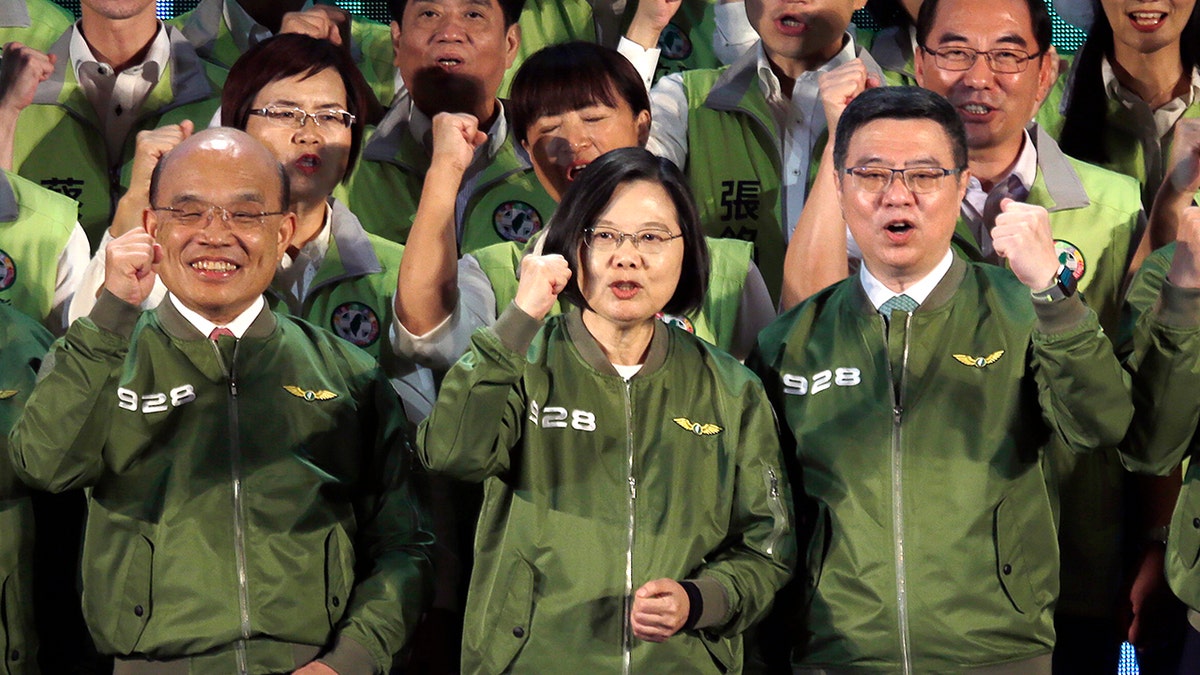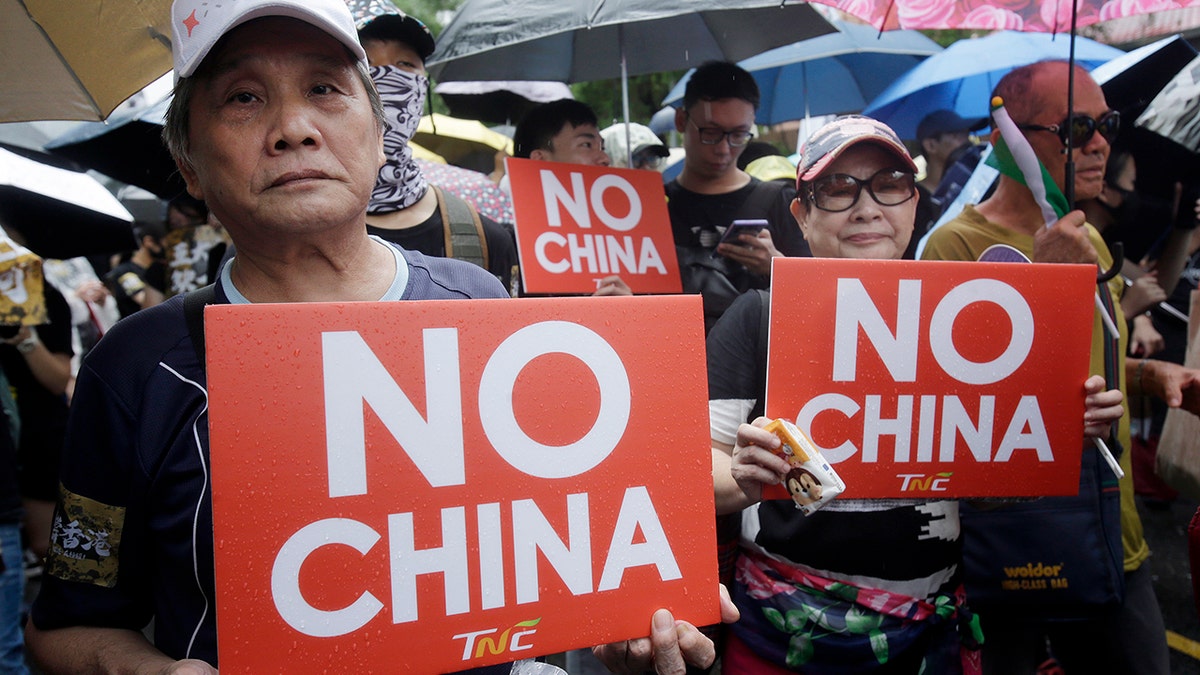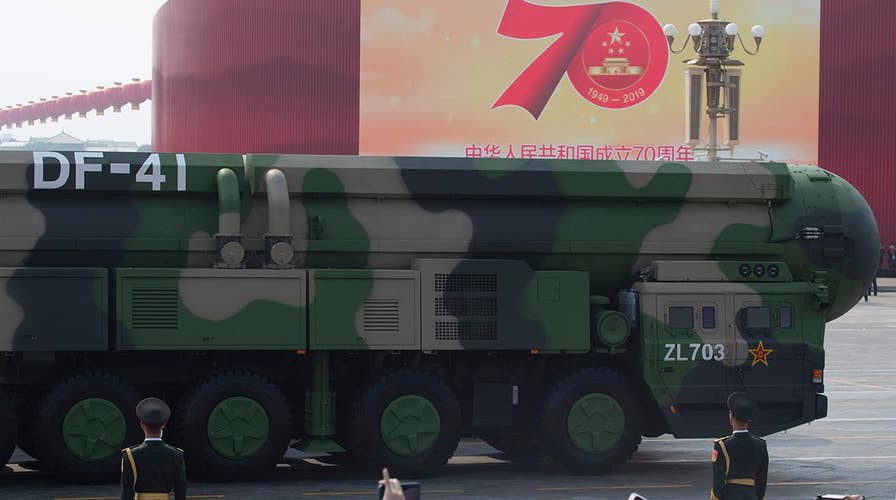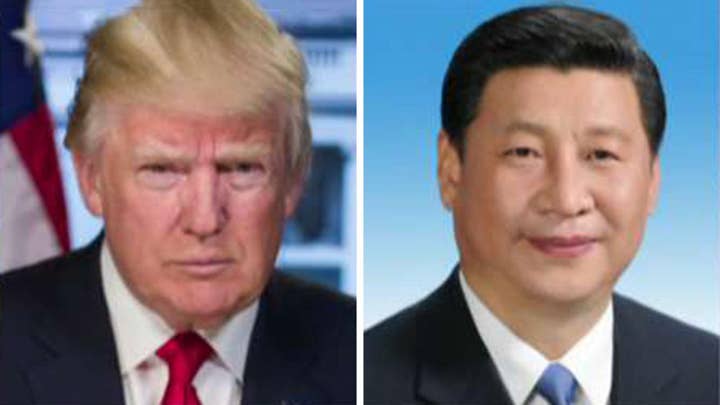China unveils nuclear missile at 70th anniversary parade
Missile could strike U.S. withing 30 minutes; retired Army Gen. Anthony Tata reacts.
China continued its challenge to U.S. hegemony in the South Pacific when Beijing enticed two of Taiwan’s closest allies into its geopolitical orbit earlier this month.
The tiny island nation of Kiribati, home to 109,367 people, was lured into switching sides after Beijing offered lucrative economic incentives, including new infrastructure projects. Taiwan quickly severed diplomatic relations with Kiribati on Sept. 20 in response to the nation's strategic defection.
This followed the Solomon Islands, another tiny yet geographically important nation of the Pacific, cutting ties with Taiwan on Sept. 16 in favor of Beijing, with the prime minister citing economic inducements as the trigger behind the move.
CHINA SHOWS GLOBAL MILITARY AMBITION AT PARADE MARKING 70 YEARS OF COMMUNIST RULE
Kiribati and the Solomon Islands flip means Taiwan has formal diplomatic relations with only 15 countries, including Guatemala, Honduras, Nicaragua, and Haiti.
The news of two small Pacific island nations switching sides from Taiwan to China may seem like a relatively small matter to most, but in the world of geopolitics, upholding key regional alliances is of critical importance and the loss of these allies will have a major impact. The Pacific has long been a stronghold of support for Taiwan and the loss of Kiribati and the region’s most populous island nation has sparked fears of a contagion effect in the region.
“China's strategy of poaching Taiwan's allies is a numbers game," said Senior Asia Analyst Zhixing Zhang of Stratfor to Fox News. "Fewer allies for Taiwan means fewer votes for key issues related to Taiwan in the United Nations and other international bodies. Kiribati matters because it means one fewer partner that Taiwan can depend on. The Solomon Islands defection was even more notable given the comparative size of the Solomon’s to Kiribati."
These geopolitical developments are a blow to Taiwanese President Tsai Ing-wen, who has faced an intensifying Chinese pressure campaign to isolate Taiwan and cut it off from key diplomatic allies.
GOP LAWMAKERS SLAM CHINESE COMMUNIST PARTY'S 'APPALING RECORD OF REPRESSION' ON 70TH ANNIVERSARY
The moves are seen as stemming from China’s objective of consolidating near-total control of Taiwan while still allowing it to remain semi-autonomous, much like the “one country, two systems” model that governs relations with Hong Kong. Taiwan’s president warned as much when she asserted that the “one country, two systems” policy could not work because democracy and authoritarianism cannot co-exist.

Taiwan President and presidential candidate of Democratic Progressive Party (DPP) in the 2020 elections Tsai Ing-wen, center, cheers with party members during the party's anniversary in Taipei, Taiwan, Saturday, Sept. 28, 2019. (AP Photo/Chiang Ying-ying)
China’s power play can also be viewed as a savvy political move -- at a time of crisis, with the trade war and protests in Hong Kong -- to weaken the Taiwanese president. President Ing-wen has been more confrontational with Beijing since taking power in 2016 and is up for a tough re-election bid in January 2020. Since the current president’s term in office, China has peeled off one-third of Taiwan’s diplomatic allies.
“Taiwan’s president has been deeply unpopular with officials in Beijing, who accuse her of pushing for the island’s independence," said Bradley Jardine, Global Fellow at the Wilson Center, to Fox News. "Diplomatic blows such as these may help sway voters toward the China-friendly opposition. China’s own state media recently said as much, warning that the president’s re-election will lead to Taiwan having zero allies."
China’s economic diplomacy is a coordinated effort to gain greater influence and access across Eurasia and the Pacific. The “Belt and Road Initiative,” a massive infrastructure project and major component of China’s rise, can result in lavish returns for participating nations.
Chinese President Xi Jinping's Belt and Road Initiative, originally conceived in 2013, would create an extensive network of railways, roads, bridges, maritime ports, and energy pipelines stretching from East Asia to Europe. Some estimate that China will spend between $1.2-$1.3 trillion by 2027. Beijing also established the China International Development Cooperation Agency (CIDCA) to unify its foreign aid program, particularly since China’s foreign assistance budget increased by about 14 percent between 2003 and 2015.
HONG KONG POLICE ACCUSED OF BEING 'TRIGGER-HAPPY AND NUTS' CROWDS PROTEST SHOOTING OF TEEN
Beijing’s economic assistance is also not tied to strict government reform or human rights conditions, allowing authoritarian nations to benefit from economic aid and ignore serious international human rights standards. This model has been Beijing’s standard approach to foreign policy and assistance since the 1960s, which stresses certain principles such as sovereignty and noninterference in internal affairs, with equal cooperation and mutual benefit.
This has led to a growing concern within the U.S. of China’s slow and steady rise in a region the U.S. has dominated since the end of World War II. China’s efforts must also not be confused with altruistic foreign policy aims of helping disadvantaged communities or the advancement of developing nations, experts say.
“China’s agenda here is domestic," Jardine said. "Xi Jinping has long seen the idea of 'uniting Taiwan' as a prestige project to rival Deng Xiaoping’s ‘reform and opening.’ By achieving this policy objective, he would cement himself a powerful legacy."
CLICK HERE TO GET THE FOX NEWS APP
Xi’s legacy will also be measured by how effectively he can defend against President Trump’s costly trade war in the near term and countering U.S. primacy in the long term. Part of any arrangement that would truly challenge the U.S. would be to call into question Washington’s commitment to defend Taiwan in the event of an invasion or attack from Beijing.
Since the end of the Chinese Civil War in 1949, Taiwan has been governed independently of Beijing and conducts free and fair democratic elections. China, on the other hand, considers it a province and an integral part of its history and declares that there is only “one China.” Relations between China and Taiwan have been governed upon a mutually agreed consensus that Taiwan will not seek formal independence.

Hong Kong students and Taiwanese supporters hold slogans during a march in Taipei, Taiwan, Sunday, Sept. 29, 2019. Sunday's demonstration was part of global "anti-totalitarianism" rallies planned in over 60 cities worldwide, including in Australia and Taiwan, to denounce "Chinese tyranny." (AP Photo/Chiang Ying-ying)
The security landscape in the region remains unknown. Taiwan has made it clear it will not pay more to retain its allies and the U.S. has long neglected the region, even with President Obama’s “Pivot to Asia.” The U.S. doesn’t match China’s large investments and infrastructure projects that allow leaders to boost domestic support. U.S. money tends to be targeted toward improving governance and education – worthy objectives but they often fail to align with the short-term motivations of local politicians, Jardine explained.
CLICK HERE FOR THE ALL-NEW FOXNBUISINESS.COM
With President Trump’s seeming disdain for alliances--abandoning international agreements such as the Paris Climate Accord and the Iran nuclear deal and his overall transactional approach to foreign policy--many worry that any aggression or confrontation with China will go unanswered.
“China's increasing economic domination of East Asia and its growing links in the broader Pacific means that countries are more hesitant than ever to agree to join in U.S. initiatives that confront Beijing," Stratfor’s Zhang told Fox News, "which undermines the U.S. ability to counterbalance China. Long-term, China may begin to upgrade these economic ties into strategic control of key ports or infrastructure."












































